Intensification of russian shelling, destroyed buildings, and constant threat to life are the realities of the work of journalists in the Sumy Region at the time of the Ukrainian offensive in the Kursk Oblast. The correspondent of the National Union of Journalists of Ukraine‘s (NUJU) information service spoke with the media representatives of Velyka Pysarivka, Bilopillia, Krasnopillia, and Sumy to find out how they manage to do their work in such extreme conditions.
“More guided bombs are coming in the direction of the Sumy Region. A few days ago, the air raid alert lasted 28 hours in Sumy,” says Volodymyr Sadivnychyi, the head of the Sumy organization of the NUJU. “And communities near the border suffer from artillery and mortar attacks.”
According to Volodymyr Sadivnychyi, bus delivery to some of the border settlements where the evacuation was carried out has been canceled. Recently, a drone targeted a car that was moving along the highway between the settlements of Bilopillia and Putyvl. There were noticeable problems with the mobile connection.
“Shelling with both missiles and mortars has become more frequent,” says Oleksandr Motsnyi, the editor-in-chief of the Peremoha newspaper, which is published in the border town of Krasnopillia. “Artillery shelling also takes place. People are being killed, injured, there is great destruction… Of course, we, along with the whole of Ukraine, are happy that our troops have gone on the offensive, but, probably, our feelings are not the same as somewhere in Kyiv or Volyn. Here, 5-10 kilometers from the border, fear of “retaliation” is added to the joy. Because we can see the fate of Velyka Pysarivka or Bilopillia, where our side had previously invaded russian territory, we hope that a sanitary zone will really be created in the Kursk Oblast so that it does not reach us. And we believe in Victory.”
“We must inform those who stayed in Velyka Pysarivka”
Velyka Pysarivka, the center of which was subjected to enemy devastating bombardment, was officially evacuated back in May – early June.
“Today, there is not a single administrative building in the village that would survive – each one has some degree of damage or destruction,” the head of the Velyka Pysarivka Community, Liudmyla Biriukova, said in a comment to the NUJU. “As for the private sector, the police hotline in the community received more than one and a half thousand calls as of today. But, given the active hostilities, we are currently not recording any destruction. Shelling happens every day. At the same time, strangely enough, we are seeing the return of people – at first, they came to feed the animals, and today, the gas service records 600 households where people live permanently and 200 – where people just visit their homes.”
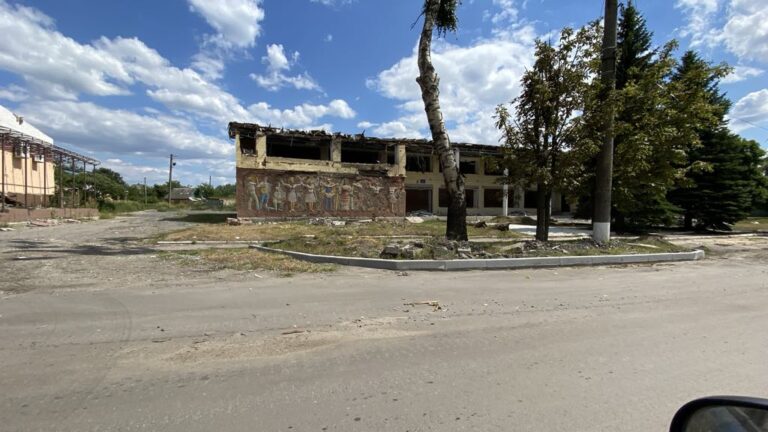
After several hits near the newsroom of the Vorskla newspaper, its team was forced to leave the village. Now, the newspapermen work remotely. Editor-in-chief Oleksii Pasiuha jokes that at one time, he “got married profitably,” and now, he is able to live and work with his mother-in-law in a village near Okhtyrka.
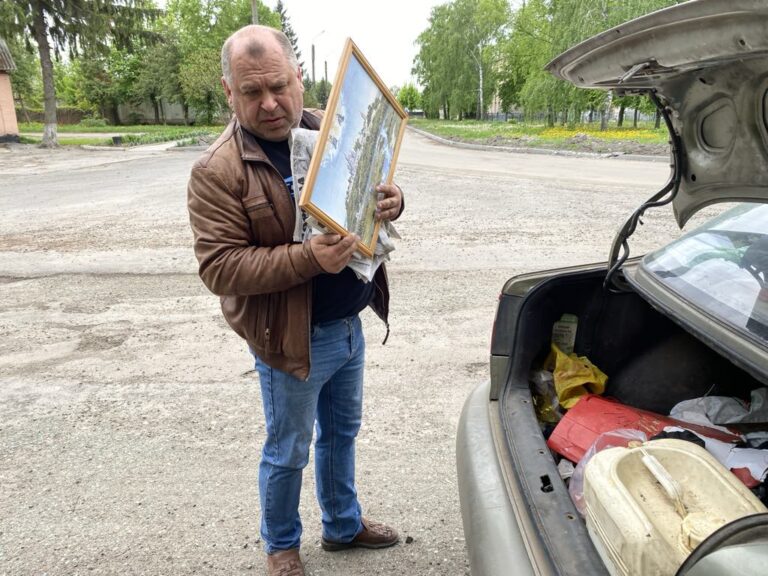
However, he spends several days a week in Velyka Pysarivka: he has to visit the destroyed office, distribute the circulation of the newspaper to those who subscribed to it in the newsroom, and collect materials for future journalistic publications.
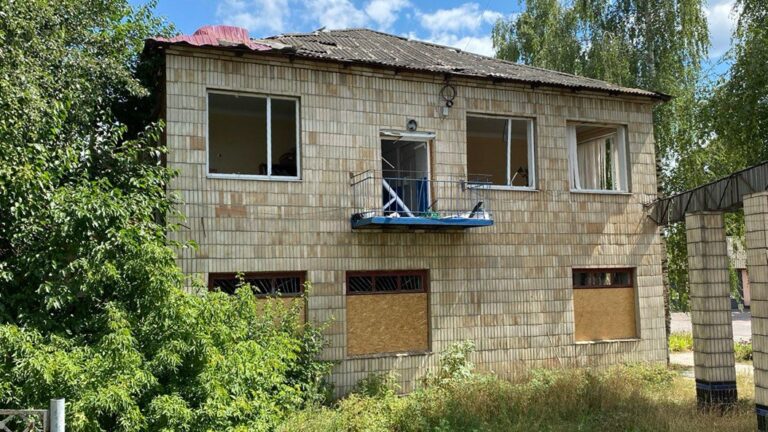
“We arrived in Pysarivka yesterday. It was very loud,” said the editor in a comment to the NUJU. “My wife and I accompanied the well-known Ukrainian journalist Olha Musafirova, who plans to write about the residents of Velyka Pysarivka. We are very happy about this – we are always happy when people are interested in us.”
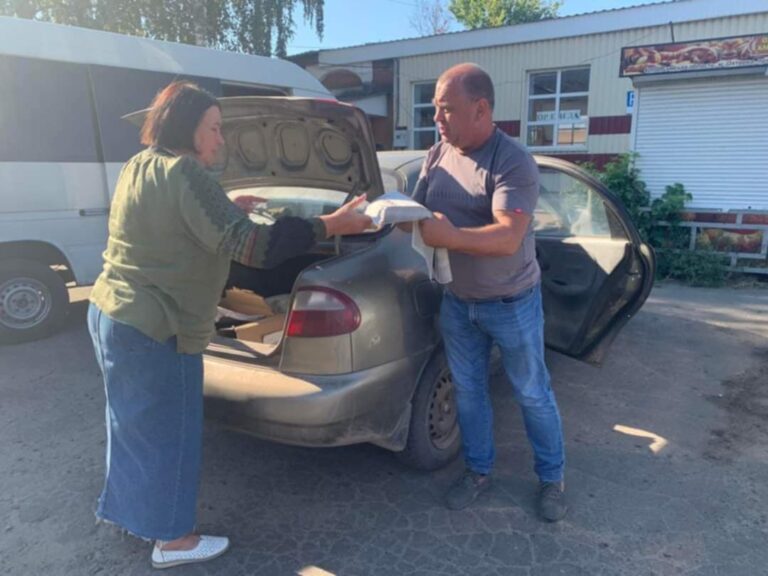
The Velyka Pysarivka Community is located far from the site of the Kursk offensive (it borders the Belgorod Oblast), but the intensity of shelling has increased here as well.
“However, we continue to work. We must inform those who, despite the evacuation, stayed in Velyka Pysarivka and nearby villages. We also focus on readers in Okhtyrka. They even applied for a subscription to Ukrposhta,” Oleksii Pasiuha says. “It is easy to close the newspaper, but to open it again… later… is incredibly difficult: the audience forgets the publication in an instant. We will work even for free so that there is something to print for.”
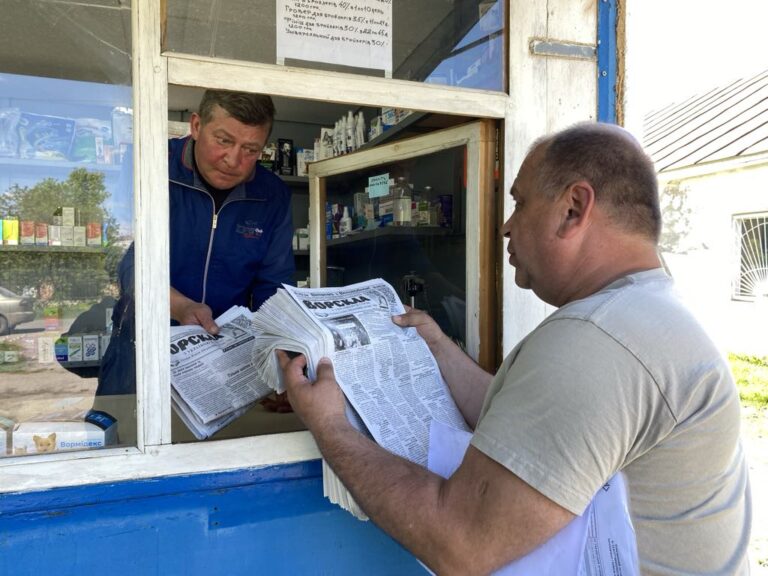
“Four houses were destroyed around the Bilopilshchyna’s newsroom. Our driver came under fire.”
In Bilopillia, located not far from the russian Tyotkino village in the Kursk Oblast, seven kilometers from the border, an evacuation was also announced in May when ten guided bombs flew into the city in one day.
Bilopillia was actively shelled throughout May. Some people left, some stayed.
“We talked about a possible relocation with journalists from Bilopillia and Krasnopillia,” says the head of the Sumy Regional organization of the NUJU, Volodymyr Sadivnychyi. “The National Union of Journalists of Ukraine intends to even compensate certain expenses for the rent of a joint newsroom in case of moving to Sumy. However, the editors of newspapers Bilopilshchyna and Peremoha (Krasnopillia) are still staying in their cities.”
According to Bilopilshchyna editor-in-chief Nataliya Kalinichenko, several newsroom workers have left the city. The newsroom evacuated its archive and valuables, made electronic copies of materials from the main computer.
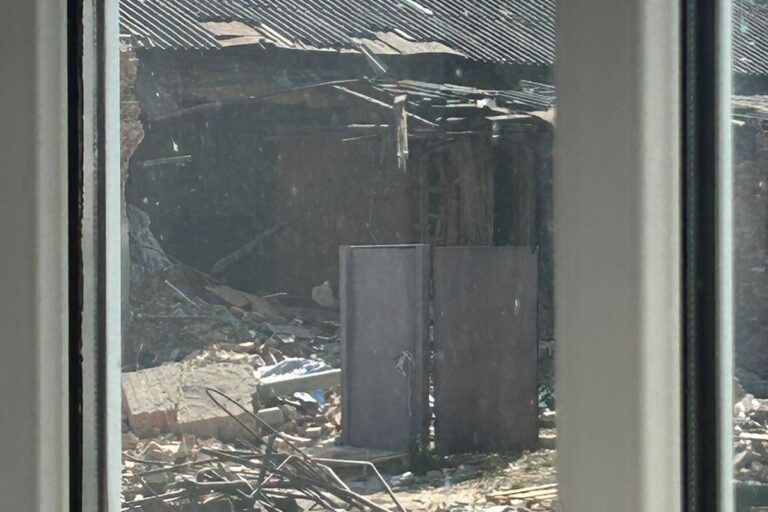
“Four houses were destroyed around our newsroom: the one next door, opposite…,” says Nataliya Kalinichenko. “The ceiling collapsed in part of the newsroom. Often, there is no connection, no Internet. Of course, it is very difficult and scary to work in such conditions, to deliver newspapers to shops… Our driver has already come under fire. Only once did he leave the store, and it immediately hit into that store… We thank the NUJU, which allocated a bulletproof vest for the driver. And the last week in Bilopillia was a horror in general: all types of weapons that we knew and that we still didn’t know were used against the settlement.”
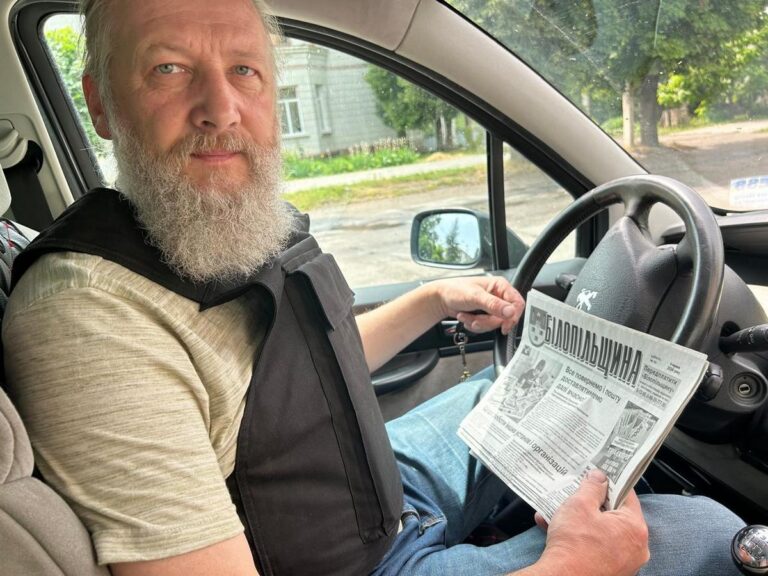
However, the editorial equipment necessary for daily work remained in Bilopillia, and the newsroom continues to work on it.
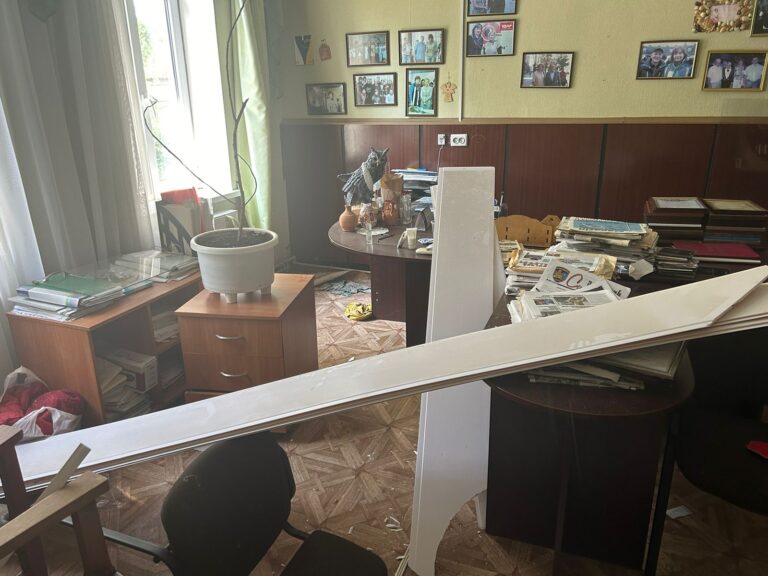
“But as of now, we are, as they say, on our suitcases. At any moment, they are ready to put a seal in the bag and leave the city,” says the editor.
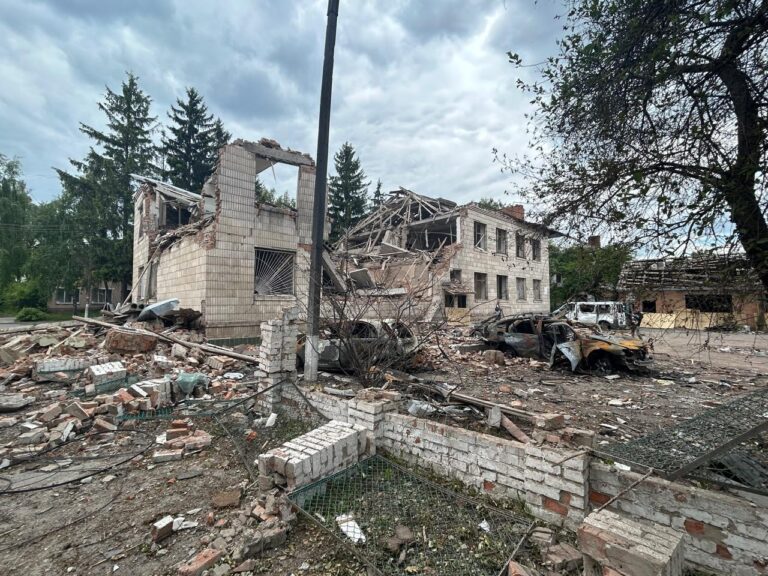
In conditions where the publication and distribution of the paper newspaper is under threat, the newsroom is working on improving the Bilopillia.City website.

“What confuses us the most is who will see the results of our work if the post office and shops are not open? A website is a solution but there are also problems here: the person who ran the website was evacuated to a remote village where the internet is bad. In addition, problems with mobile communication at the border are commonplace,” says Nataliya Kalinichenko. “But nothing, we are working.”
According to Nataliya Kalinichenko, since the soldiers of the russian Volunteer Corps entered russian territory through the area of Bilopillia, the community has received increased attention from the international media. The next surge was when the evacuation was intensified.
“At a certain point, our newsroom turned into a kind of office, where you can charge your equipment before traveling, find the right speakers, contacts in populated areas, drink coffee,” says Nataliya Kalinichenko. “One group of foreign colleagues was filming the harvest. All of them returned dirty. They asked if it was possible to swim in the river. “No,” I say, “it is mined.” “Is there a shower?” – they ask. Of course, we have to help your colleagues….”
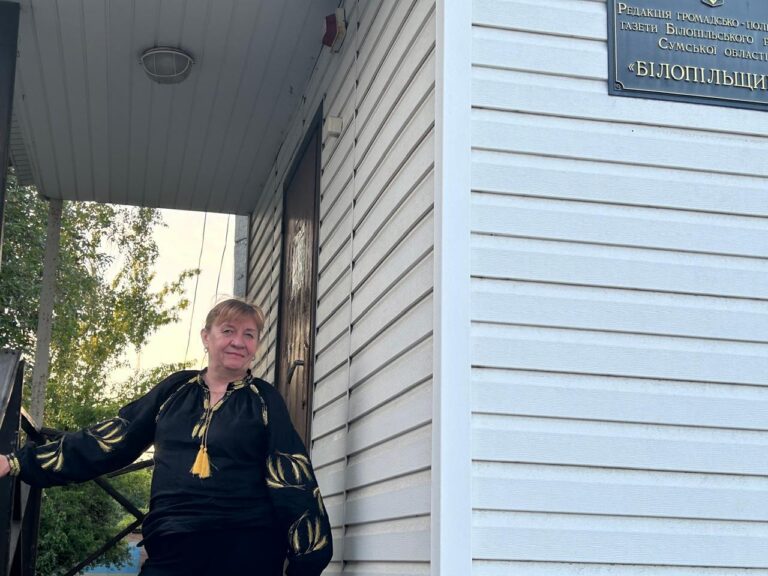
“There is much noise in Krasnopillia these days – obviously, it is connected with the offensive”
The mostly female staff of the Krasnopillia newspaper, Peremoha, also remains in their hometown.
“We are still here,” says Oleksandr Motsnyi, the editor-in-chief and the only man in the newsroom. “We work on the spot, recording shelling and crimes committed by the russian military. We all have AFU accreditation. Literally yesterday, another issue in Krasnopillia was scattered through mailboxes. Although loud these days – obviously, it is connected with the offensive….”

Oleksandr Motsnyi cites a recent guided bomb hitting a residential area of Krasnopillia, which destroyed about thirty private houses, as an example of intensifying attacks. Some of them cannot be restored. One elderly woman was immediately pulled out from under the rubble by neighbors, which saved her life. The museum of the famous weightlifter Leonid Zhabotynskyi, a native of Krasnopillia, was seriously damaged during the bomb attack.
“Our usual working day: to prepare material from a guided bomb funnel or a funeral of those killed…” Oleksandr Motsnyi states sadly.
Shelling has become especially frequent since the start of the offensive on the Kursk Oblast. At night, artillery duels became commonplace. It’s a little quieter during the day, but guided bombs and missiles have been used lately.
“The walls are literally shaking. Once, one of them hit two kilometers from my house. All doors flew opened…,” says the editor. “If it continues to “fly in,” we will have to think about evacuation.”
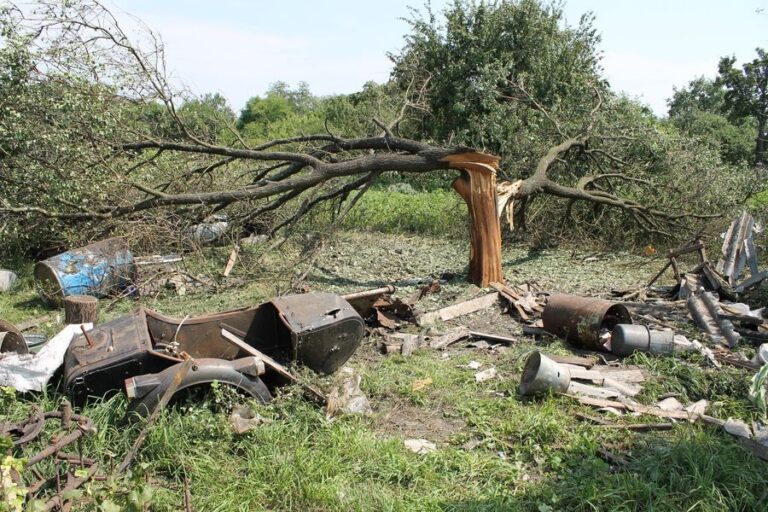
The situation in the Sumy Region is worsening every day. Journalists still do not know whether they will be able to work in their cities and beyond, given the increased security requirements in the 20-kilometer border zone. Therefore, leaving homes may become inevitable.
Despite all the difficulties and dangers, Sumy Region journalists continue their important mission of informing citizens and documenting the events of the war. Their steadfastness and dedication to their profession is a vivid example of the invincibility of the Ukrainian spirit. However, every day, the work becomes more and more dangerous, and the issue of evacuation can arise acutely at any moment.
The National Union of Journalists of Ukraine continues to support its colleagues in the front-line territories, providing the necessary assistance and resources. The situation remains tense, but Sumy media workers are ready to continue to fulfill their professional duties, even in the most difficult conditions.
Maksym Stepanov, NUJU Information Service

 THE NATIONAL UNION OF
JOURNALISTS OF UKRAINE
THE NATIONAL UNION OF
JOURNALISTS OF UKRAINE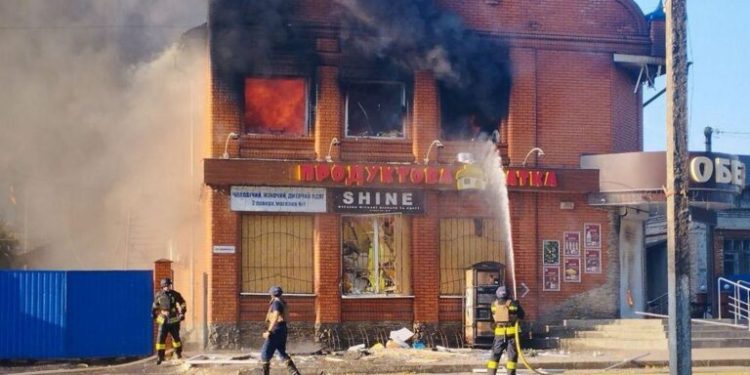
















Discussion about this post